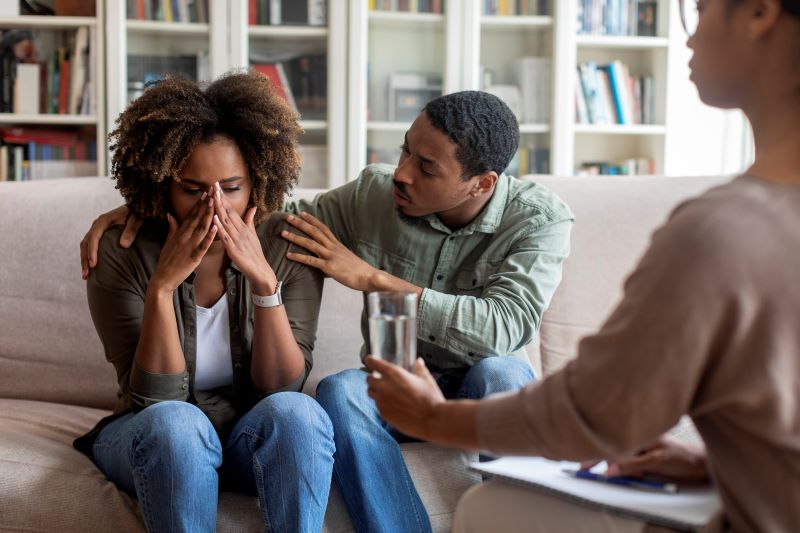Marriage & Family Therapist in Arlington TX
If you are in need of a marriage counselor or couples counselor in Arlington then our caring counselors are here to help you. When it comes time to find a marriage counselor it is important to work with your spouse in order to find a counselor that can work with both of your schedules. Our family therapists in Arlington will ensure that they stand by your and your family during the whole process to ensure it is as comfortable as possible. While many people may not seek out a marriage counselor, those that do know that they need some sort of help. Working with a marriage and family therapist can go a long way, and you did a great job by taking the first step and searching for one.
Marriage and family problems are among some of the hardest to bear because it involves your loved ones and at times your only support system. Email us or give us a call today to set up an appointment and get your life back. You may have some questions before you call such as:

- Does marriage counseling work?
- Can I get couples counseling if I am not married?
- Do family therapists work with the kids as well?
- How do I know I need a family therapist?
- Is a family therapist connected to CPS?
While marriage and family therapy can be a touchy topic, it is important to reach out to a professional to help you before things get worse.
Do I need marriage counseling?
Whether you are married or not, couples counseling can be very effective if you are in a committed relationship and want to make the relationship last. If you are committed to making your relationship work then communication will be key. Working with a couples counselor is a way for couples to open up and ask/answer uncomfortable questions in a controlled environment. Since there is roughly a 40% divorce rate in the US, it is quite clear that many people are in need of a marriage counselor. While the numbers may be high, you don’t have to be part of a statistic if you reach out for help and be proactive in saving your relationship.
According to World Population Review:
- Every 13 seconds, there is one divorce in America.
- More than 554 divorces occur during your typical romantic comedy movie.
- There are 19,353,568 divorces over the course of an average first marriage that ends in divorce (8 years).
- Over a 40 year period, 67 percent of first marriages terminate.
- 15 percent of adult women in the United States are divorced or separated today, compared with less than one percent in 1920.
Speak with a marriage counselor in Arlington today!
When you are looking for a counselor in Arlington, it may be difficult to find the right fit. Working with a counselor long-term means building trust in the counselor/patient relationship. What many do not know is that you can switch your counselor at any time if you feel that the relationship is not a good fit. Our caring counselors have years of experience and will help you along the healing process.


Contact Us For Marriage & Family Counseling Services in Arlington
Speak with a marriage counselor in Arlington today!
When you are looking for a counselor in Arlington, it may be difficult to find the right fit. Working with a counselor long-term means building trust in the counselor/patient relationship. What many do not know is that you can switch your counselor at any time if you feel that the relationship is not a good fit. Our caring counselors have years of experience and will help you along the healing process.
FAQ
Do marital problems affect my family?
Marital problems can have significant effects on a family in various ways. Here are some common ways in which marital problems can impact the family unit:
- Emotional distress: Marital problems often lead to emotional distress for both partners, and this distress can spill over to other family members, especially children. Witnessing conflict, tension, and unhappiness between parents can cause anxiety, fear, sadness, and confusion in children. It can also affect the emotional well-being of other family members, such as parents or siblings who may feel caught in the middle or burdened by the situation.
- Communication breakdown: When a couple is experiencing marital problems, effective communication within the family may suffer. Open and healthy communication is essential for maintaining a supportive and cohesive family environment. Marital problems can lead to miscommunication, misunderstandings, and a breakdown of trust, making it challenging for family members to express their needs, concerns, and emotions.
- Changes in family dynamics: Marital problems can disrupt the dynamics within a family. Parents who are struggling in their relationship may become distant, preoccupied, or emotionally unavailable to their children. This can impact the parent-child bond, as well as the overall functioning of the family. Children may feel a sense of instability or uncertainty if there are ongoing conflicts or if there are discussions about separation or divorce.
- Negative impact on children: Children are particularly vulnerable to the effects of marital problems. Research has shown that prolonged exposure to marital conflict can have long-term negative consequences on children’s emotional, social, and academic well-being. They may experience difficulties in school, exhibit behavioral problems, have lower self-esteem, and struggle with forming healthy relationships in the future.
- Financial strain: Marital problems, especially those related to financial issues, can create significant financial strain on a family. Arguments about money, increased legal expenses during separation or divorce, and changes in living arrangements can lead to financial instability and stress for all family members.
- Health consequences: Marital problems can also impact the physical and mental health of family members. Ongoing stress, tension, and conflict can contribute to increased levels of anxiety, depression, and other mental health issues. It can also manifest in physical health problems, such as headaches, sleep disturbances, and weakened immune systems.
It’s important to address and seek help for marital problems as early as possible to minimize the negative impact on the family. Marriage counseling or therapy can provide tools and strategies to improve communication, resolve conflicts, and strengthen the relationship, thereby benefiting the entire family unit.
Does marriage counseling is only for couples or can other family members participate?
While marriage counseling primarily focuses on the couple’s relationship, it is not uncommon for other family members to participate in the counseling process as well. The inclusion of other family members in therapy sessions can be beneficial in certain situations, especially when the marital problems have broader impacts on the family dynamics or when there are specific issues involving children or extended family members.
Here are a few scenarios where involving other family members in marriage counseling may be helpful:
- Parent-child dynamics: If the couple is experiencing difficulties related to parenting or if there are concerns about the impact of the marital problems on children, involving children in therapy sessions can provide a platform for open communication, understanding each other’s perspectives, and addressing any specific challenges within the parent-child relationship.
- Blended families: In cases where there are stepchildren or complex family dynamics due to remarriage or blending of families, involving all relevant family members in counseling can help establish better communication, build relationships, and address any conflicts or challenges that arise within the extended family.
- Extended family involvement: Sometimes, marital problems may involve extended family members, such as in-law conflicts or issues related to caregiving responsibilities. In such cases, involving these family members in counseling sessions can facilitate discussions, understanding, and resolution of conflicts that may be impacting the couple’s relationship.
- Support systems: In certain situations, it can be helpful to include close family members or friends who serve as a support system for the couple. These individuals can provide insights, offer different perspectives, and contribute to the overall healing process within the family unit.
Including other family members in marriage counseling sessions is a decision made in collaboration with the therapist. The therapist can assess the specific needs of the couple and the family and determine whether involving other family members would be beneficial for the therapeutic process.
What’s the difference between marriage therapy and family therapy?
Marriage therapy, also known as couples therapy or couples counseling, focuses specifically on the relationship between two partners. It aims to address and resolve issues, conflicts, and challenges within the marital relationship. The primary goal of marriage therapy is to improve communication, strengthen the bond between partners, enhance intimacy, and promote a healthier and more fulfilling partnership.
Family therapy, on the other hand, takes a broader perspective and involves working with the entire family unit. It focuses on the relationships and dynamics among all family members, not just the couple. Family therapy aims to improve communication, resolve conflicts, and promote understanding and cooperation within the family system. The focus is on identifying and addressing patterns of interaction, exploring family roles, and creating a more harmonious and functional family environment.
While marriage therapy primarily concentrates on the couple’s relationship and dynamics, family therapy considers the interconnectedness and interdependence of all family members. Family therapists may address a range of issues, including parent-child conflicts, sibling rivalries, generational patterns, extended family dynamics, and the impact of external stressors on the family system.
It’s worth noting that there can be overlap between marriage therapy and family therapy. In some cases, marriage therapy may incorporate family therapy principles and involve other family members as needed. Likewise, family therapy may address specific marital issues if they are affecting the overall family dynamics.
The choice between marriage therapy and family therapy depends on the specific needs and goals of the individuals involved. Couples who primarily want to focus on their relationship and improve their marital bond may choose marriage therapy, while families seeking to address broader family dynamics and relationships would opt for family therapy. Consulting with a qualified therapist can help determine the most appropriate approach for your specific situation.
